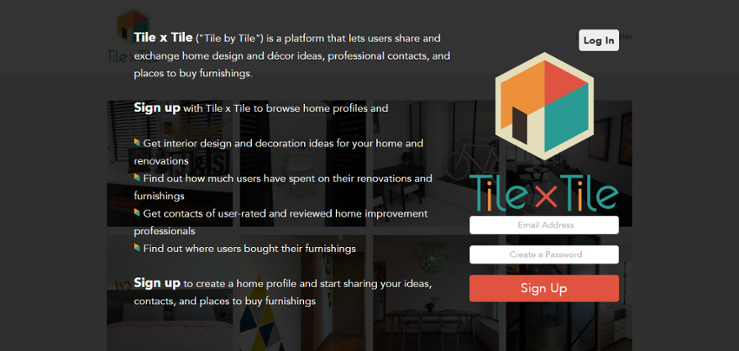If I ended up walking away with nothing, I couldn’t say that I lost everything. I was forced to develop resilience which I think is the most important lesson and takeaway from this experience, says Brandon Leong of JFDI Asia Discover startup Tile X Tile.

1. Tell us about your startup and team – who are you, and what are you aiming to do?
My name is Brandon Leong and I was a consultant with KPMG doing due diligence and strategy and operations projects for four years. Although I run the day-to-day on my own, I do have an investor.
We are aiming to build a community platform called Tile x Tile (“Tile by Tile”), www.tilextile.com where homeowners and renters can share and exchange, design and decoration ideas, service provider contacts, and places to buy furnishings with each other.
2. What brought you to JFDI Discover?
I came to JFDI Discover because I felt I needed some structure and an outside opinion on the approach I was taking to validate my idea and prototype.
3. Why did you start this business?
I started this business because of the number of family and friends complaining about their renovation nightmares and not being able to find a structured resource, which was able to give them objective and independent information that they could use in their research of renovations and decorations.
4. What were some of the challenges you faced before joining JFDI Discover?
As a one-man team, the loneliness of being with your own thoughts is a challenge. Playing advocate and devil’s advocate can consume and can send you in a downward spiral where you are stuck in self doubt questioning your decision to pursue this. I like to call it my “dark place”. I think that’s one of the biggest challenges a lone founder faces and it really is a test of mental strength and resilience. My advice is being able to quickly identify when you are sending yourself into your “dark place” and to nip it in the bud by going through all that you have done to show that you have made progress in learning and developing or working out to get your mind off the negativity.
Choosing the right co-founder was a challenge. Even though you’ve worked with someone before, you never really know who they are until they are faced with uncertainty and risk. It is easier said than done to try and pick someone you know has the same mindset and approach as you, given that it’s only when thrusted into these circumstances that you can really identify these problems. However, I would advise you to quickly resolve these issues with your co-founders, and even go your separate ways because you might just end up holding each other back. Once you get rid of your anchor, you’ll find that you can really be creative and explore. Progress will come a lot faster. I know it has worked for me.
5. How did JFDI Discover help your startup?
JFDI Discover helped by making me review the approach that I had adopted to make sure I had validated my assumptions. It also made me realize that there were certain things that may have been overlooked.
6. What was your favorite and least favorite aspect of JFDI Discover?
Favorite part was being able to meet the other founders of the other teams, and to hear about their ideas and challenges. It was nice to interact with people in a work setting again. Least favorite aspect was that we don’t get as much coaching time as I would have liked. Two twenty-minute sessions seem a bit short.
7. What is the one lesson you took away from JFDI Discover that you think other founders should know too?
I think I was getting too caught up in the methodology as the end all and be all. All business ideas and businesses are unique and require context. The methodology is a guideline that has been formulated to help you structure your process or approach and to validate your ideas so that you can get it off the ground. But it’s not a step-by-step must-do checklist. I think the principles it teaches are important The structure helps greatly to make sure you do validate your assumptions, and is a good way to track your progress and accountability. From JFDI Discover, I realized that what’s important is to not force your idea into a framework. There are so many different books written about the same principles but with different variations because, after all, it’s not one-size-fits-all.
8. Where is your team planning to go from here?
I will be focusing on trying to not only build content through home profiles but also observing and learning homeowner and renter behaviour. We want to understand their drawbacks and attraction towards the site so that we can understand what would motivate users to contribute to the site. We hope to have at least 50 home profiles on the site which we will source manually, and even some profiles that were created autonomously. We are already working on deploying some changes to the site by the end of year which will hopefully help us progress further.
9. Which resources do you look to for startup related advice? Have you read any books on startups?
I use the internet as my main resource for startup related advice. You’ll be amazed at what kind of free literature you can find if you look hard enough (I haven’t bought a book yet). Books and websites I’ve read include: Y-Combinator Playbook, The Lean Startup, Paul Graham’s Start Up Advice for the Lazy and The Startup Owner’s Manual.
10. What topics do you want us to write about? We want to hear from you because you the expert as the audience.
I think case studies of different kinds of startups (market place, social media, mobile apps, etc) that have used the lean methodology would be helpful. Write-ups that not necessarily focus on how using lean helped them but put more emphasis and elaboration on the kinds assumptions they made, methods they employed to validate their assumptions, their learnings, and the like.
11. Who would you recommend to JFDI Discover?
I would recommend people with a business idea but don’t know where to start. It’s a good starting point and is structured to equip you with the tools to validate your idea.
12. What was the biggest surprise for you coming out of the program?
While the JFDI Discover program was on-going, I was surprised that I was able to give advice to a fellow founder based on my previous experience. I realized how important and relevant all my experiences, not just for me but also for other people as I shared what I learned to them.
13. How has doing a startup impacted your life?
Although, its been a tough learning journey with more downs than ups, I enjoy being able to come up with new ideas to try solve issues that I face. It not only has forced me to meet up with a lot more people and to widen my network, but it has also showed me the amount of support that friends are willing to give me as I figure out the business idea. If I ended up walking away with nothing, I couldn’t say that I lost everything. I was forced to develop resilience which I think is the most important lesson and takeaway from this experience.
 Steph Jarina is on the editorial team of JFDI.Asia. You can follow her on Twitter at @stephjarina.
Steph Jarina is on the editorial team of JFDI.Asia. You can follow her on Twitter at @stephjarina.


